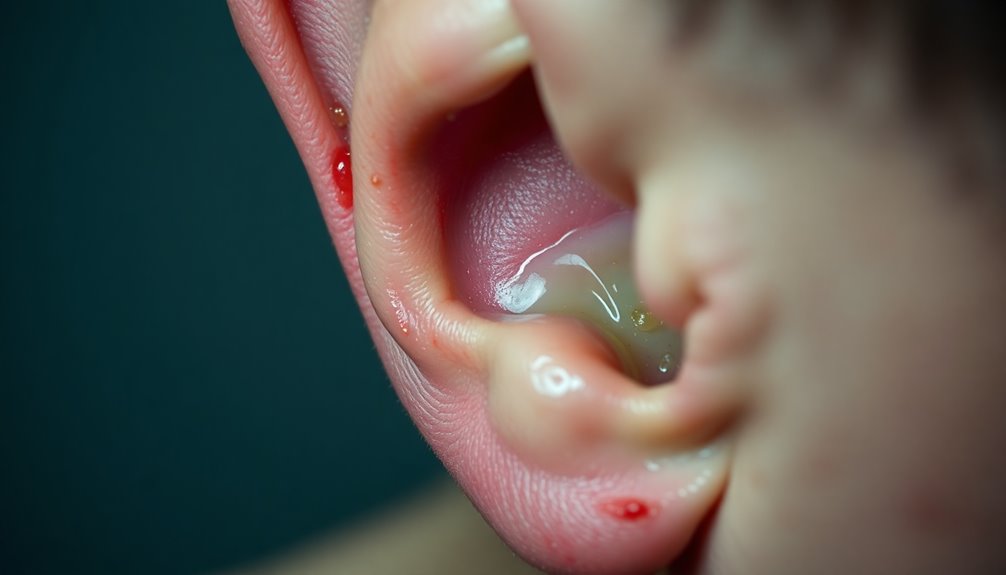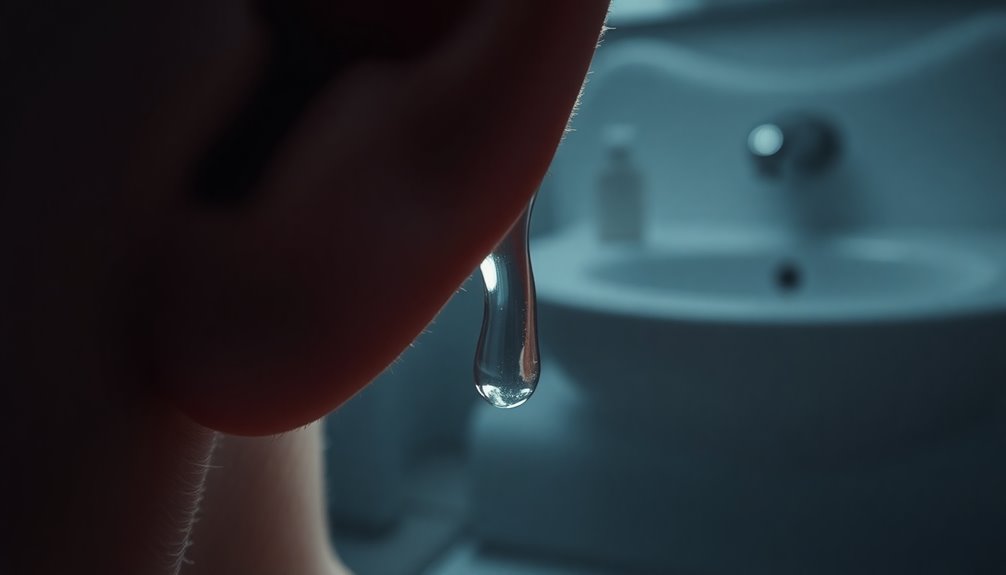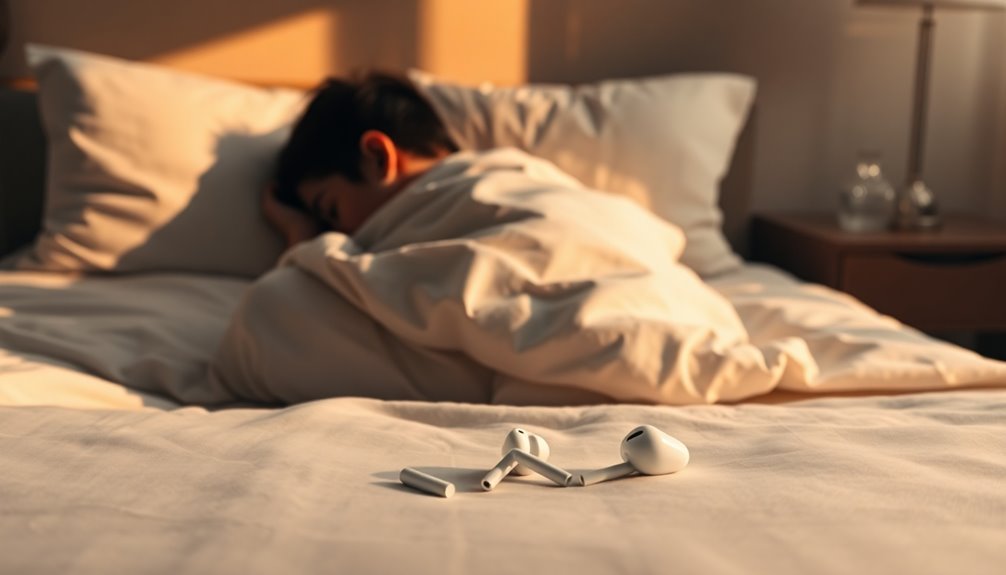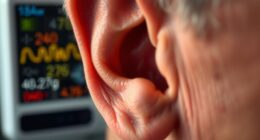If your ear stinks, it often points to an infection or excessive wax buildup. Bacteria, yeast, and fungi thrive in warm, moist environments, leading to unpleasant odors. You might also notice foul-smelling discharge, especially if you're dealing with an ear infection or conditions like seborrheic dermatitis. Neglecting ear hygiene can worsen the issue, so it's vital to keep your ears clean and dry. Pay attention to any accompanying symptoms, like pain or hearing loss, as they may signal a need for medical attention. Stick around to uncover more about common causes and how to tackle this issue effectively.
Key Takeaways
- Ear odor often signals infections, which can be bacterial, viral, or fungal, especially when accompanied by discharge or pain.
- Excessive earwax buildup can trap bacteria, leading to unpleasant smells and requiring careful management.
- Conditions like cholesteatoma or mastoiditis may produce foul-smelling discharge and need urgent medical evaluation.
- Poor hygiene can exacerbate odor; regular cleaning with mild soap and avoiding cotton swabs is crucial.
- Persistent ear odor should prompt a doctor's visit, especially if accompanied by hearing loss, fever, or dizziness.
Understanding Ear Odor

Understanding ear odor can be puzzling for many people. You might notice an unpleasant smell emanating from your ears, and it could stem from various underlying issues. Ear infections are often the culprits. Bacterial, viral, or fungal infections can lead to a foul-smelling discharge, especially in middle or inner ear infections. If you're experiencing pain, fever, or even hearing loss alongside the odor, it's crucial to consult a healthcare provider for proper treatment. Additionally, untreated ear infections can lead to complications such as mastoiditis, which also causes foul-smelling discharge.
Another common cause of ear odor is excessive earwax buildup. When wax accumulates, it can trap bacteria and dirt, resulting in bad smells. You might be tempted to use cotton swabs to clean your ears, but that can push the wax further in and make things worse. Symptoms like earache or a feeling of fullness can indicate a blockage.
Certain medical conditions can also contribute to ear odor. Disorders like cholesteatoma or mastoiditis can produce foul-smelling discharge. A healthcare provider's examination is necessary to pinpoint the exact cause of your ear odor. Understanding these factors can help you address the issue and find effective solutions.
Common Causes of Smelly Ears

Smelly ears can be a frustrating and embarrassing issue, often caused by a variety of underlying factors. One common culprit is infections, particularly from bacteria, yeast, and fungi that thrive in warm, moist environments. If you've recently had an ear piercing or developed an external ear infection, you might experience smelly discharge. Conditions like swimmer's ear can also lead to unpleasant odors, especially after swimming in unclean water. Additionally, bacterial growth may occur in warm, moist areas, further exacerbating the odor.
Skin and scalp issues, such as seborrheic dermatitis or dandruff, can contribute to odors behind your ears. These conditions can make your skin flaky and irritated, and scratching can worsen the situation, increasing the risk of infections.
Earwax accumulation is another factor. Excessive earwax can create a breeding ground for bacteria and dirt, resulting in bad smells. Sometimes, earwax can even migrate to the skin behind your ears, causing additional odor.
Lastly, environmental factors, like pollution or substances from hair products, can trap odors in the area. If you're experiencing smelly ears, identifying the underlying cause is essential to finding an effective solution.
The Role of Hygiene

Maintaining proper hygiene plays a crucial role in preventing and managing ear odor. Regularly clean the area behind your ears with a mild soap or gentle cleanser. Use a soft cloth or cotton ball to avoid irritation, and make sure to dry the area thoroughly to prevent moisture buildup. Avoid using cotton swabs in your ear canal, as they can cause injury and push wax deeper.
When it comes to the ear canal, remember that earwax is a natural cleaner and moisturizer. You shouldn't regularly remove it. To keep your ear canal dry, consider using ear plugs or bathing caps while swimming. After bathing, tilt your head to the side to help excess water drain out. Maintaining ear hygiene can reduce the risk of infections that may contribute to unpleasant odors.
Managing sweat and moisture is equally important. Keep the area behind your ears cool, and choose breathable fabrics to avoid trapping heat. An alcohol-free antiseptic solution can help disinfect the skin. Additionally, use lightweight, non-comedogenic hair products to minimize residue buildup. By incorporating these hygiene practices into your routine, you can significantly reduce ear odor and promote overall ear health.
When to See a Doctor

While good hygiene can help reduce ear odor, certain symptoms may signal a need for medical attention. If you experience hearing problems or notice watery discharge from your ear, it's time to consult a doctor. Pay close attention if fluid leaks from your ear, especially if it's accompanied by fever, dizziness, or hearing loss. Cholesteatoma can develop from a collapsed eardrum, leading to a persistent, smelly ear discharge that requires medical evaluation.
Ear pain, itching, or irritation can also indicate an underlying issue that shouldn't be ignored. Serious symptoms, like high fever, swelling around the ear, or blood coming from your ear—especially following a head injury—require immediate medical help. Dizziness or vision troubles, combined with severe sore throat or vomiting, are red flags that you shouldn't overlook.
Watch for specific conditions like middle or outer ear infections, damage to the eardrum, or a cholesteatoma. Although rare, ear cancer can present with bad-smelling earwax or bloody discharge. If your symptoms worsen or you've suffered a head injury, don't hesitate to seek immediate medical attention. A healthcare professional will likely use an otoscope for examination and may refer you to an ENT specialist for further investigation.
Preventative Measures for Healthy Ears

Taking care of your ears is essential for preventing odor and potential health issues. Start by protecting your hearing in loud environments. Wear earplugs at concerts, construction sites, or noisy workplaces, and consider custom earplugs recommended by an audiologist. Sounds over 85 decibels can cause permanent damage, so monitor your device volumes carefully.
Maintaining proper ear hygiene is also crucial. Avoid cotton swabs, as they can push wax deeper. Instead, clean the outer ear with a soft cloth during your showers. Over-the-counter ear drops can help soften excessive earwax, but never insert objects into your ear canal. Excessive earwax can also lead to unpleasant odors, so regular cleaning is important.
Keeping your ears dry is vital too. After swimming or bathing, tilt your head to let water drain, and use a soft towel to dry the outer ear. You might want to use swimmer's earplugs to prevent moisture from entering.
Finally, promote overall ear health by exercising regularly to improve blood flow. Engage in relaxation techniques to manage stress, and get a baseline hearing test during annual checkups. By following these preventative measures, you can maintain healthy ears and avoid unpleasant odors.
Frequently Asked Questions
Can Ear Odor Indicate a Serious Health Issue?
Yes, ear odor can indicate a serious health issue. When you notice a bad smell, it might signal an infection, like otitis externa or a middle ear infection. It could also point to foreign objects trapped in your ear or a cholesteatoma. Don't ignore these signs! If you experience pain, hearing loss, or discharge, it's crucial to consult a healthcare professional for an accurate diagnosis and appropriate treatment.
How Can I Differentiate Between Bacterial and Fungal Infections?
To differentiate between bacterial and fungal infections, you should pay attention to your symptoms. If you experience intense itching and a thick, creamy discharge, it's likely fungal. Bacterial infections usually cause more pain and may have a pus-like discharge. A doctor can help by using an otoscope for a visual inspection and may take an ear swab for lab testing. If antibiotics don't work, it's probably a fungal infection.
Are Certain Foods Linked to Ear Odor?
Certain foods can indeed be linked to ear odor. If you consume a lot of dairy, gluten, or sugary foods, you might notice an increase in ear wax production, which can contribute to unpleasant smells. High-salt and processed foods can also affect your ear health. To minimize odors, try maintaining a balanced diet, reducing sugar and dairy intake, and opting for gluten-free alternatives if you're sensitive. It could make a difference!
Can Wearing Headphones Contribute to Ear Smell?
Yes, wearing headphones can definitely contribute to ear smell. When you use them for extended periods, moisture and sweat get trapped, creating an environment for bacteria to thrive. If you don't clean both your headphones and the area behind your ears regularly, odors can build up. To minimize this, make sure to clean your headphones often and take breaks to let your ears breathe. Good hygiene is key to preventing unpleasant smells.
Is Ear Odor Common in Children?
Yes, ear odor can be common in children, especially during ear infections. If your child has an ear infection, you might notice a foul smell coming from their ear. This often happens when fluid builds up and bacteria grow. Alongside the odor, you may see other symptoms like ear pain, fussiness, or trouble sleeping. Keeping an eye on these signs can help you catch any issues early and seek medical advice if needed.
Conclusion
In conclusion, if you're dealing with ear odor, it's essential to understand the underlying causes and maintain good hygiene. Don't ignore the signs—if the smell persists or worsens, consult a doctor to rule out any serious issues. Taking preventative measures can keep your ears healthy and odor-free. Remember, your well-being matters, so pay attention to your body. Stay proactive, and don't hesitate to seek help when needed!









